Why are government developers dominating the land sales market in Tianjin?
By Sean Linkletter, Analyst at JLL Tianjin Research
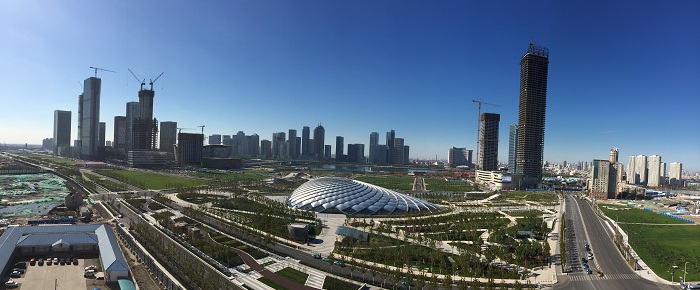 In recent years, we have noticed that government-backed developers have dominated the land sales market, while private developers have, for the most part, stayed on the sidelines. According to data collected from CREIS, a data platform hosted by Fang.com, we noticed that over the past three years, eight of the top ten land sales transactions in Central Tianjin, in terms of total value, came from government-backed developers. We set out to briefly examine the reasons for this trend as well as the some of the basic fundamentals driving the land market.
In recent years, we have noticed that government-backed developers have dominated the land sales market, while private developers have, for the most part, stayed on the sidelines. According to data collected from CREIS, a data platform hosted by Fang.com, we noticed that over the past three years, eight of the top ten land sales transactions in Central Tianjin, in terms of total value, came from government-backed developers. We set out to briefly examine the reasons for this trend as well as the some of the basic fundamentals driving the land market.
Land Sales Market and Government Revenue
Tianjin's local government, much like many other cities in China, is still heavily reliant on land sales for revenue. In 2014, for example, around 33% of Tianjin government's annual revenue came from land sales, according to the Tianjin Local Finance & Taxation Bureau. Given that land is a finite resource, Tianjin's local government releases new land supply incrementally. This prevents a situation where too much land is sold in a single year, leaving limited supply for sale in future years.
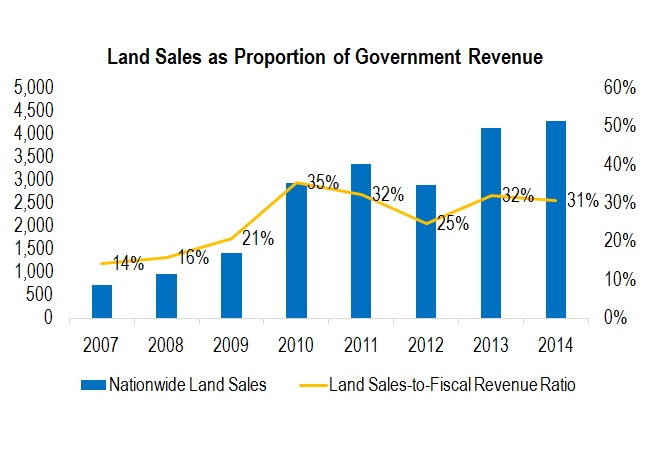
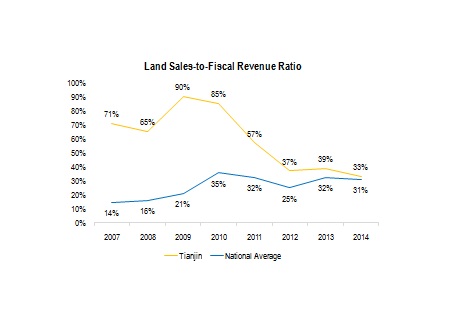 Source: CEIC, National Statistics Bureau
Source: CEIC, National Statistics Bureau
In theory, the sustainability of land sales as a revenue source should not be an issue. Once the land is sold and developed, it should generate a perpetual stream of tax revenues, providing the government with a long-term tax solution. In this sense, the government is not simply looking to maximize the gain on land sale, but to ensure that the land is a dependable source of future tax income. Additionally, land banking - a concept where developers hold land for an extended period of time - is prohibited, meaning that land, in theory, must start development within two years of the time of sale.
One issue is that without a residential property tax, the government has to lean more heavily on commercial property, creating an incentive for additional commercial zoning. Land plots are now very rarely sold purely for residential use, almost always featuring a commercial component. This is also a reason that office buildings, shopping malls, hotels, and serviced apartments continue sprouting up in Tianjin despite relatively high vacancy rates and low rents in each of the commercial property sectors.
Office buildings generate tax revenue through an annual tax paid by the companies that register in them. This is why Yujiapu - a new development area that incorporates policies from Tianjin's pilot free trade zone (FTZ) - is still able to generate commercial tax revenue, despite very few companies having physical presence in their office buildings. Other commercial property types - like retail and hotels - pay a value-added tax (VAT).
In Tianjin, some districts have much stronger fiscal positions than others. Apart from proceeds obtained from land sales, district governments get the majority of their revenue from these commercial taxes. District governments often compete over businesses, enticing them to register in their district to bolster their commercial tax base. Heping District features majority of the city's office stock (and companies registered within them) which gives it an edge over other districts, though in recent years, other districts have made a strong push to build out their commercial base.
A glaring example is Hexi District, where in 2014, land sales amounted to an astounding RMB 35.7 billion, a figure nearly double the 2015 combined total land sales in Central Tianjin. Most of the land was sold in New Badali - a new development area with a total planned GFA of close to 1.9 million sqm which features eight plots of land designated for mixed use.
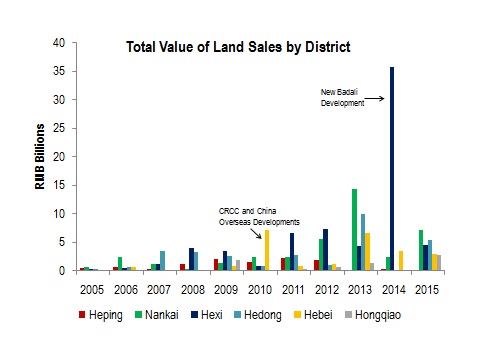
Source: CREIS, JLL Research
The role of government-backed developers
The New Badali development is that the land purchasers came entirely from government backgrounds. The area's major purchasers include locally-backed developers Tianfang and Bohai Development and also the state-owned-enterprise developer, China Overseas.
The spike in land sales volume in Hebei District in 2010 was also due to a pair of SOE developers, China Overseas and China Railway Construction Corporation (CRCC), which developed 1.3 million square meters of mixed-use space. The Hebei District also greatly lags behind other districts in terms of commercial tax revenue.
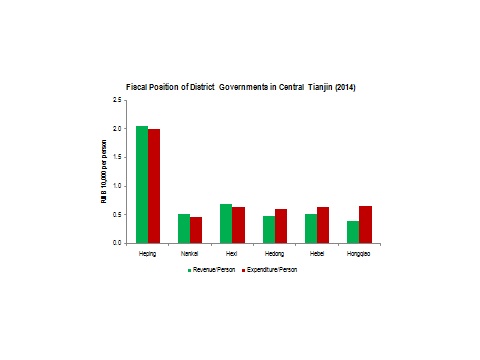
Source: Tianjin Statistics Bureau
The land plots in New Badali are sold for relatively high prices, especially considering the area where the plots are located is in a fairly underdeveloped part of Hexi District. At an average of around RMB 14,000 per sqm of buildable area, these government-backed developers paid around a 20% premium for land relative to the district average.
Developers in Tianjin tend to earn most returns through residential sales, which have proven to be quite lucrative when the market is hot. Developing the commercial component, on the other hand, can be quite risky. Given the relative oversaturation in the commercial market, developers in Tianjin often find it difficult to sell commercial units at an attractive price. On the other hand, developers that hold property for its rental income will see a slower return of their initial investment, requiring them to have "deeper pockets".
It is fairly typical in China for only government-backed developers to take on projects in so-called "new development areas" like New Badali. These developers are not focused solely on investment return, but act as government tools to carry out initiatives like developing a property type that is needed but its development is unprofitable and will not be undertaken by the private market. Government developers may also help brand the city by developing iconic buildings.
In the case of New Badali area, they are helping the Hexi District by diversifying its tax base once the commercial projects are completed. To the developers' fortune, several residential projects in the area have actually done quite well due to the run up in residential prices witnessed during late 2015 and early 2016. China Overseas' project Fuxing Jiuli, for example, reportedly achieved a 99% sales rate of its high rise units within five quarters of completion.
In other cases, government sometimes will not sell land unless the developer can meet certain mandates - like architecture style, building height and so on. Local governments prefer to work with developers from government backgrounds for speed and efficiency considerations, helping to fast-track development. The present day Jinwan Plaza, a 592,000 sqm mixed use project alongside Tianjin's Hai River in Heping District is an example of this. Before the plot was sold in 2008, the district government mandated that the land should be developed into a project that would feature western-style architecture to help decorate the riverside area. Tianjin Financial City, a local government developer, ended up winning the project, as private developers expressed little interest.
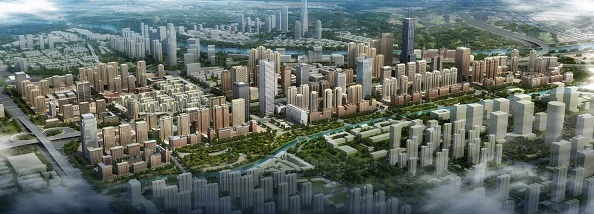
Conclusion
The local government has a vested interest in keeping land prices high. On one hand, the local government, which relies heavily on land sales as a source of revenue, directly benefits from the sale of land at higher prices. On the other hand, rising land values are pivotal to sustaining the "building economy" - the concept that property development and investment in infrastructure gives rise to economic growth and employment in related industries, like construction and raw materials.
Over the years, we have seen government-backed developers play a large role in shaping Tianjin's real estate market. They are winning majority of land auctions and often times, paying higher prices for land. However, while it is true that the local government has incentive to maintain high land prices, government developers are also building projects that align with long term goals of local district governments.
---END---